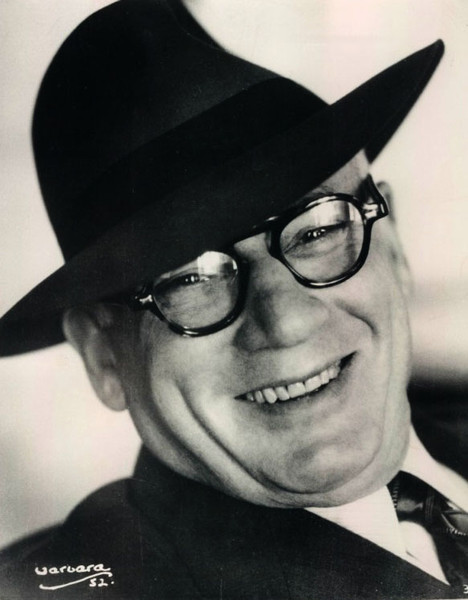This Week in Classical Music: April 8, 2024. Sol Hurok, Impresario.Hewas neither a musician nor a composer, but Sol Hurok did for classical music in America more than almost any other person we can think of.Hurok was born Solomon Gurkov on April 9th of 1888 in Zarist Russia and moved to New York in 1906.A natural organizer, he started with left-wing politics in Brooklyn; that didn’t last long as he switched to representing musicians: Efrem Zimbalist and Mischa Elman, the talented violinists who also emigrated from Russia, were among his first clients.He represented the Russian bass Fyodor Chaliapin for several years (he also worked with Nellie Melba and Titta Ruffo).He then turned to dance: Anna Pavlova, Isadora Duncan, and Michel Fokine became his clients, as well as the Ballet Russe de Monte Carlo.In 1942, he organized one of the first tours of the American Ballet Theatre.
Hurok represented Marian Anderson when working with black singers was not a popular undertaking; he helped to organize Anderson’s famous concert at the Lincoln Memorial, which was broadcast nationwide and made her a household name.Among Hurok’s longest associations were those with Arthur Rubinstein and Isaac Stern.The list of Hurok’s clients read as Who-is-Who in American Music: he worked with the cellist Gregor Piatigorsky, violinists Nathan Milstein and Efrem Zimbalist, and later represented the younger stars, Van Cliburn, Jacqueline du Pré, Itzhak Perlman, and Pinchas Zukerman.
For many years Hurok tried to bring Soviet artists to America.It became possible only after Stalin’s death.The pianists Emil Gilels and violinist David Oistrakh came first, in 1955, then, later, such luminaries as Sviatoslav Richter, Vladimir Ashkenazy, Leonid Kogan and Mstislav Rostropovich.Hurok also represented the singers Galina Vishnevskaya and Irina Arkhipova and conductors Kiril Kondrashin and Yevgeny Svetlanov.Some of Hurok’s greatest coups were achieved with the ballet companies: the Bolshoi tour in 1959 was a sensational success, and so was Kirov’s, which Hurok brought in 1961.
Sol Hurok, 2024
This Week in Classical Music: April 8, 2024. Sol Hurok, Impresario. He was neither a musician nor a composer, but Sol Hurok did for classical music in America more than almost any other person we can think of. Hurok was born Solomon Gurkov on April 9th of 1888 in Zarist Russia and moved to New York in 1906. A natural organizer, he started with left-wing politics in Brooklyn; that didn’t last long as he switched to representing musicians: Efrem Zimbalist and Mischa Elman, the talented violinists who also emigrated from Russia, were among his first clients. He represented the Russian bass Fyodor Chaliapin for several years (he also worked with Nellie Melba and Titta Ruffo). He then turned to dance: Anna Pavlova, Isadora Duncan, and Michel Fokine became his clients, as well as the Ballet Russe de Monte Carlo. In 1942, he organized one of the first tours of the American Ballet Theatre.
other person we can think of. Hurok was born Solomon Gurkov on April 9th of 1888 in Zarist Russia and moved to New York in 1906. A natural organizer, he started with left-wing politics in Brooklyn; that didn’t last long as he switched to representing musicians: Efrem Zimbalist and Mischa Elman, the talented violinists who also emigrated from Russia, were among his first clients. He represented the Russian bass Fyodor Chaliapin for several years (he also worked with Nellie Melba and Titta Ruffo). He then turned to dance: Anna Pavlova, Isadora Duncan, and Michel Fokine became his clients, as well as the Ballet Russe de Monte Carlo. In 1942, he organized one of the first tours of the American Ballet Theatre.
Hurok represented Marian Anderson when working with black singers was not a popular undertaking; he helped to organize Anderson’s famous concert at the Lincoln Memorial, which was broadcast nationwide and made her a household name. Among Hurok’s longest associations were those with Arthur Rubinstein and Isaac Stern. The list of Hurok’s clients read as Who-is-Who in American Music: he worked with the cellist Gregor Piatigorsky, violinists Nathan Milstein and Efrem Zimbalist, and later represented the younger stars, Van Cliburn, Jacqueline du Pré, Itzhak Perlman, and Pinchas Zukerman.
For many years Hurok tried to bring Soviet artists to America. It became possible only after Stalin’s death. The pianists Emil Gilels and violinist David Oistrakh came first, in 1955, then, later, such luminaries as Sviatoslav Richter, Vladimir Ashkenazy, Leonid Kogan and Mstislav Rostropovich. Hurok also represented the singers Galina Vishnevskaya and Irina Arkhipova and conductors Kiril Kondrashin and Yevgeny Svetlanov. Some of Hurok’s greatest coups were achieved with the ballet companies: the Bolshoi tour in 1959 was a sensational success, and so was Kirov’s, which Hurok brought in 1961.
Sol Hurok died in New York on March 5th of 1974.